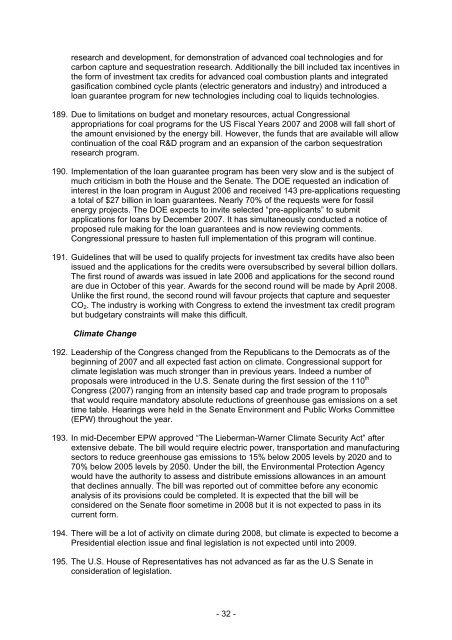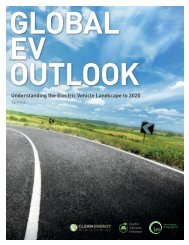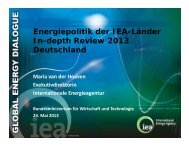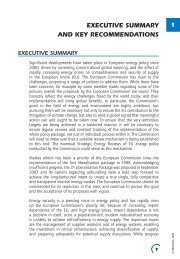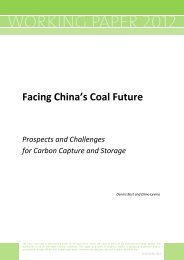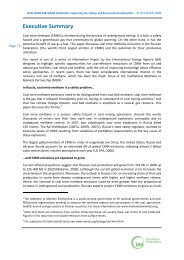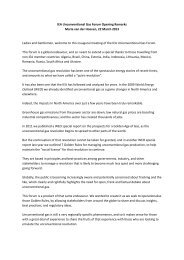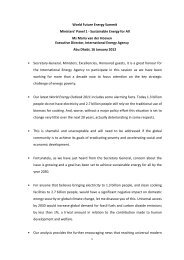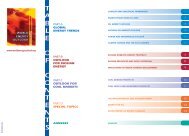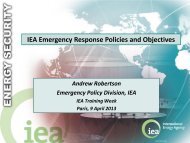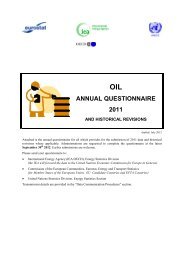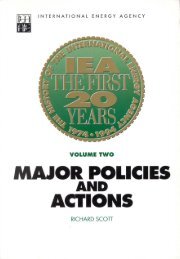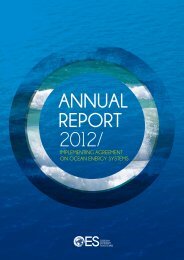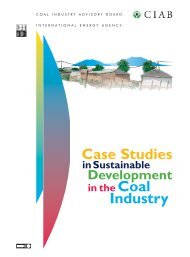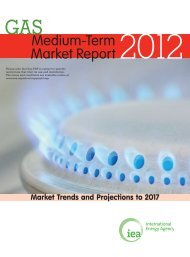CIAB Market & Policy developments 2005/06 - IEA
CIAB Market & Policy developments 2005/06 - IEA
CIAB Market & Policy developments 2005/06 - IEA
You also want an ePaper? Increase the reach of your titles
YUMPU automatically turns print PDFs into web optimized ePapers that Google loves.
esearch and development, for demonstration of advanced coal technologies and for<br />
carbon capture and sequestration research. Additionally the bill included tax incentives in<br />
the form of investment tax credits for advanced coal combustion plants and integrated<br />
gasification combined cycle plants (electric generators and industry) and introduced a<br />
loan guarantee program for new technologies including coal to liquids technologies.<br />
189. Due to limitations on budget and monetary resources, actual Congressional<br />
appropriations for coal programs for the US Fiscal Years 2007 and 2008 will fall short of<br />
the amount envisioned by the energy bill. However, the funds that are available will allow<br />
continuation of the coal R&D program and an expansion of the carbon sequestration<br />
research program.<br />
190. Implementation of the loan guarantee program has been very slow and is the subject of<br />
much criticism in both the House and the Senate. The DOE requested an indication of<br />
interest in the loan program in August 20<strong>06</strong> and received 143 pre-applications requesting<br />
a total of $27 billion in loan guarantees. Nearly 70% of the requests were for fossil<br />
energy projects. The DOE expects to invite selected “pre-applicants” to submit<br />
applications for loans by December 2007. It has simultaneously conducted a notice of<br />
proposed rule making for the loan guarantees and is now reviewing comments.<br />
Congressional pressure to hasten full implementation of this program will continue.<br />
191. Guidelines that will be used to qualify projects for investment tax credits have also been<br />
issued and the applications for the credits were oversubscribed by several billion dollars.<br />
The first round of awards was issued in late 20<strong>06</strong> and applications for the second round<br />
are due in October of this year. Awards for the second round will be made by April 2008.<br />
Unlike the first round, the second round will favour projects that capture and sequester<br />
CO 2 . The industry is working with Congress to extend the investment tax credit program<br />
but budgetary constraints will make this difficult.<br />
Climate Change<br />
192. Leadership of the Congress changed from the Republicans to the Democrats as of the<br />
beginning of 2007 and all expected fast action on climate. Congressional support for<br />
climate legislation was much stronger than in previous years. Indeed a number of<br />
proposals were introduced in the U.S. Senate during the first session of the 110 th<br />
Congress (2007) ranging from an intensity based cap and trade program to proposals<br />
that would require mandatory absolute reductions of greenhouse gas emissions on a set<br />
time table. Hearings were held in the Senate Environment and Public Works Committee<br />
(EPW) throughout the year.<br />
193. In mid-December EPW approved “The Lieberman-Warner Climate Security Act” after<br />
extensive debate. The bill would require electric power, transportation and manufacturing<br />
sectors to reduce greenhouse gas emissions to 15% below <strong>2005</strong> levels by 2020 and to<br />
70% below <strong>2005</strong> levels by 2050. Under the bill, the Environmental Protection Agency<br />
would have the authority to assess and distribute emissions allowances in an amount<br />
that declines annually. The bill was reported out of committee before any economic<br />
analysis of its provisions could be completed. It is expected that the bill will be<br />
considered on the Senate floor sometime in 2008 but it is not expected to pass in its<br />
current form.<br />
194. There will be a lot of activity on climate during 2008, but climate is expected to become a<br />
Presidential election issue and final legislation is not expected until into 2009.<br />
195. The U.S. House of Representatives has not advanced as far as the U.S Senate in<br />
consideration of legislation.<br />
- 32 -


